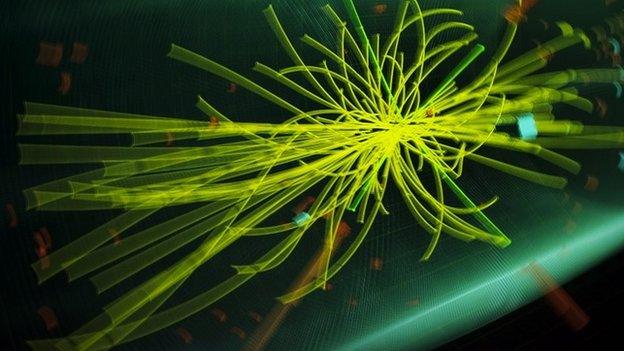Viewpoints: Reactions to Higgs boson Nobel prize win
- Published

Peter Higgs and Francois Englert have been awarded the 2013 Nobel prize in physics for their work on the theory of the Higgs boson.
Here is a selection of reactions.
Emeritus Prof Tom Kibble, physicist from Imperial College London
I am glad to see that the Swedish Academy has recognised the importance of the mass-generating mechanism for gauge theories and the prediction of the Higgs boson, recently verified at Cern.
My two collaborators, Gerald Guralnik and Carl Richard Hagen, and I contributed to that discovery, but our paper was unquestionably the last of the three to be published in Physical Review Letters in 1964 (though we naturally regard our treatment as the most thorough and complete) and it is therefore no surprise that the Swedish Academy felt unable to include us, constrained as they are by a self-imposed rule that the prize cannot be shared by more than three people. My sincere congratulations go to the two prize winners, Francois Englert and Peter Higgs.
A sad omission from the list was Englert's collaborator Robert Brout, now deceased.
David Willetts, UK minister for universities and science
I congratulate Professor Peter Higgs on his Nobel Prize. This is the 23rd Nobel Prize for Physics to come to the UK and continues a long tradition of scientific discovery.
We should also celebrate the efforts of the thousands of scientists and engineers all over the world who have worked on the Large Hadron Collider and who have participated in the long search for the Higgs Boson."
Prof Dave Charlton, University of Birmingham physicist and spokesperson for Atlas (one of LHC experiments that discovered the Higgs boson)
The award of the Nobel prize in physics to Francois Englert and Peter Higgs is richly deserved for their pioneering work a half-century ago. Their insights, together with the work of others, led us to the mechanism by which many particles gain mass.
The discovery by Atlas and CMS of a Higgs boson last year showed that Higgs and Englert's concept is realised in nature, and is a triumph of global international scientific collaboration.
Prof Stefan Soldner-Rembold, head of particle physics, University of Manchester
The journey from Peter Higgs' and Francois Englert's original prediction 50 years ago to the discovery of the Higgs particle last year has been a triumph of particle physics.
The discovery of the Higgs boson answers one of the most fundamental questions about the properties of matter in the Universe. Physicists from the UK have played a leading role in building the experiments that have made this triumph possible.
Dr Alan Barr, Oxford University physicist and UK physics coordinator for Atlas
To dream up a theory that can explain the masses of the fundamental particles of nature is a truly remarkable intellectual achievement.
No less impressive is the achievement of the experimental physicists - who had the vision to imagine, and the dedication to build, a machine that could test that idea.
Personally, I won't even start to feel satisfied until the Large Hadron Collider reaches full energy - then we can really start exploring.
Dr Frances Saunders, president of the Institute of Physics (IOP)
The work undertaken to discover the Higgs - from the original theories to the construction of the world's most powerful particle-smasher - has led to a very exciting and productive period in physics research. It has been a long journey but one that has inspired a generation to engage with the subject.
With the existence of the Higgs boson confirmed, explaining why the fundamental building blocks of nature acquire mass, we can now move on to the next challenges to our understanding such as the phenomena of dark matter and quantum gravity.
Prof Tejinder (Jim) Virdee, Imperial College London and former spokesperson for the CMS experiment at the LHC
It's wonderful news that the Physics Nobel Committee has recognised two physicists, including one from the UK, whose theoretical work launched a momentous scientific endeavour that started some 50 years ago.
The 2012 discovery of a Higgs boson at the Large Hadron Collider has been a major breakthrough for science and opens an exciting era for particle physics...
It is a great honour and privilege to be connected with this advance in science. The LHC has just started the extraction of science and is expected to continue for two more decades. We all are looking forward to uncovering further secrets of nature.
- Published8 October 2013